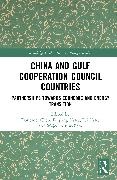Read more
This book investigates the evolving bilateral relations between China and the six Gulf Cooperation Council (GCC) countries as the global energy system undergoes a profound transformation and the architecture of international trade and investment continues to shift.
This book examines how GCC-China relations are evolving as they leverage their resource endowments, structurally transform their economies, and ramp up investments in clean technologies, low-carbon infrastructure, and resilient supply chains. It contemplates the synergistic potential of GCC-China cooperation around three overarching themes: (1) traditional energy, including hydrocarbons and associated petrochemical industries; (2) low carbon energy sources such as renewables, energy efficiency, hydrogen and nuclear energy, and (3) key enablers of the clean energy transition including climate policy framework, sustainable financing, critical minerals and digitalization. The authors of the book envision a future in which joint endeavours foster shared socio-economic benefits and promote an inclusive, orderly energy transition, with potential spillover effects that improves economic integration and structural transformation across the Middle East and North Africa. Using evidence-based and structured analysis, the authors draw on case studies and lessons learned to propose policy recommendations that foster coherence, strategy, and effective coordination between China and the GCC in the areas of energy and sustainability.
This book will be an invaluable reference for researchers and academics studying international relations, energy policy and economics, energy geopolitics and Asian and Middle Eastern studies. It will also be useful for policy analysts in academia and think tanks, and advisors and decision-makers in government and private enterprises.
List of contents
List of figuresList of tablesList of contributors Foreword
Prologue
Acknowledgment
Chapter 1: Reframing China-GCC Energy Economic Relations
Dongmei CHEN, Fuqiang YANGChapter 2: China-GCC Trade and Investment Interconnections
Tao MA, Philipp Galkin, Majid AlmoneefChapter 3: China and GCC: Prospects for Upstream/Midstream Oil and Gas Cooperation
Colin Ward, Majed Alsuwailem, Lining WANG, Kailei LIU Chapter 4: Advancing the China-GCC Strategic Partnership in the Refining and Petrochemical Industries
Abdulwahab Al-Sadoun, Guanglian PANG, Shuang WANGChapter 5: China and GCC: Progress in Industrial Capacity Cooperation
Philipp Galkin, Jing SONGChapter 6: Infrastructure Cooperation Between China and the GCC
Xia SUN, Nora N. NezamuddinChapter 7: Potential for China-GCC Cooperation Through the Lens of the Circular Carbon Economy
Mari Luomi, Xi LIANG, Fatih YilmazChapter 8: China - GCC Cooperation: Trends in Sustainable Financing and Transition Investment
Peiyuan GUO, Claudia BelahmidiChapter 9: China-GCC Collaboration on Renewable Energy Supply Chain, Haiyan QIN, Li-Chen Sim, Steven Griffiths
Chapter 10: Prospects in China-GCC Energy Efficiency Cooperation
Dongmei CHEN, Mohammad Aldubyan, Hong ZHUChapter 11: China and GCC: Prospect of Globalizing Hydrogen Markets
Robin Mills, Maryam Salman, Min WANG, Jiangpeng FENGChapter 12: Challenges and Opportunities in CCUS: Synergizing Efforts in China and GCC Countries
Xiaoliang YANG; Abdullah Alkhedhair; Abdullah AlabdulyChapter 13: China-GCC Cooperation on Nuclear Energy
Jie ZHOU, Dongmei CHEN, Noura MansouriChapter 14: Strategic Partnerships Between China and the GCC States on Geothermal Development
Zhenqian CHEN, Majed Alsuwailem, Wenxin LIChapter 15: Potential for China-GCC Collaboration on Critical Minerals
Dongmei CHEN, Jianping GEChapter 16: Innovative Digital Energy Trajectories and Benefits: China-GCC Partnership for a Sustainable Future
Sulayman Al-Qudsi, Shaikha Al-Fulaij, Weiquan WANG
About the author
Dongmei Chen is a Principal Fellow in the Oil and Gas Department at KAPSARC, Saudi Arabia. Her research focuses on China's overseas energy investment, energy trade, regional energy cooperation, and supply chain integration. With over 30 years of experience in energy and climate policy, she is dedicated to advancing the understanding of China's energy economic relations with the GCC region and the global community.
Fuqiang Yang is a Senior Advisor of the Climate Change and Energy Transition Program (CCETP) at the Institute of Energy at Peking University, China. As an expert on climate change and energy, he has worked on China's sustainable energy strategy and policy for more than 4 decades and researched extensively on energy savings in building, industrial, and transportation sectors, low carbon cities, electricity, and renewable energy, as well as climate change.
Lei Yang is a Research Professor, Deputy Dean of the Institute of Energy, and Deputy Dean of the Institute of Carbon Neutrality at Peking University, China. He is member of Global Sustainable Energy Education Council at Columbia University, USA. He has served as Senior Advisor to the Executive Director Fatih Birol of the International Energy Agency, France from 2016 to 2019; Director and Deputy Director General of National Development and Reform Commission and the National Energy Administration of China since 2002.
Majed Alsuwailem is a Senior Fellow in the Oil and Gas Department at KAPSARC, Saudi Arabia specializing in geoeconomics, natural resource governance, and sustainable energy policy. Majed holds multiple engineering and economic degrees from the University of Tulsa, USA, Texas A&M University, USA, IFP School, France and Purdue University, USA His recent research interests are highly pertinent to the evolving energy landscape. These include the economics of geothermal energy, China's energy strategy, and phantom oil.

